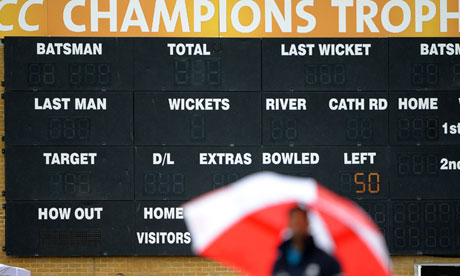Weather forecasters make hypotheses and test them daily writes Tim Harford in The FT
The UK’s national weather service, the Met Office, is to get a £1.2bn computer to help with its forecasting activities. That is a lot of silicon. My instinctive response was: when do we economists get one?
People may grumble about the weather forecast, but in many places we take its accuracy for granted. When we ask our phones about tomorrow’s weather, we act as though we are gazing through a window into the future. Nobody treats the latest forecasts from the Bank of England or the IMF as a window into anything.
That is partly because politics gets in the way. On the issue of Brexit, for example, extreme forecasts from partisans attracted attention, while independent mainstream forecasters have proved to be pretty much on the money. Few people stopped to praise the economic bean-counters.
Economists might also protest that nobody asks them to forecast economic activity tomorrow or even next week; they are asked to describe the prospects for the next year or so. True, some almanacs offer long-range weather forecasts based on methods that are secret, arcane, or both — but the professionals regard such attempts as laughable.
Enough excuses; economists deserve few prizes for prediction. Prakash Loungani of the IMF has conducted several reviews of mainstream forecasts, finding them dismally likely to miss recessions. Economists are not very good at seeing into the future — to the extent that most argue forecasting is simply none of their business. The weather forecasters are good, and getting better all the time. Could we economists do as well with a couple of billion dollars’ worth of kit, or is something else lacking?
The question seemed worth exploring to me, so I picked up Andrew Blum’s recent book, The Weather Machine, to understand what meteorologists actually do and how they do it. I realised quickly that a weather forecast is intimately connected to a map in a way that an economic forecast is not.
Without wishing to oversimplify the remarkable science of meteorology, one part of the game is straightforward: if it’s raining to the west of you and the wind is blowing from the west, you can expect rain soon. Weather forecasts begin with weather observations: the more observations, the better.
In the 1850s, the Smithsonian Institution in Washington DC used reports from telegraph operators to patch together local downpours into a national weather map. More than a century and a half later, economists still lack high-definition, high-frequency maps of the economic weather, although we are starting to see how they might be possible, tapping into data from satellites and digital payments.
An example is an attempt — published in 2012 — by a large team of economists to build a simulation of the Washington DC housing market as a complex system. It seems a long way from a full understanding of the economy, but then the Smithsonian’s paper map was a long way from a proper weather forecast, too.
Weather forecasters could argue that they have a better theory of atmospheric conditions than economists have of the economy. It was all sketched out in 1904 by the Norwegian mathematician Vilhelm Bjerknes, who published “The problem of weather prediction”, an academic paper describing the circulation of masses of air. If you knew the density, pressure, temperature, humidity and the velocity of the air in three dimensions, and plugged the results into Bjerknes’s formulas, you would be on the way to a respectable weather forecast — if only you could solve those computationally-demanding equations. The processing power to do so was to arrive many decades later.
The missing pieces, then: much better, more detailed and more frequent data. Better theory too, perhaps — although it is striking that many critiques of the economic mainstream seem to have little interest in high-resolution, high frequency data. Instead, they propose replacing one broad theory with another broad theory: the latest one I have seen emphasises “the energy cost of energy”. I am not sure that is the path to progress.
The weather forecasters have another advantage: a habit of relentless improvement in the face of frequent feedback. Every morning’s forecast is a hypothesis to be tested. Every evening that hypothesis has been confirmed or refuted. If the economy offered similar daily lessons, economists might be quicker to learn. All these elements are linked. If we had more detailed data we might formulate more detailed theories, building an economic map from the bottom up rather than from the top down. And if we had more frequent feedback, we could test theories more often, making economics more empirical and less ideological.
And yet — does anyone really want to spend a billion pounds on an economic simulation that will accurately predict the economic weather next week? Perhaps the limitations of economic forecasting reflect the limitations of the economics profession. Or perhaps the problem really is intractable.
'People will forgive you for being wrong, but they will never forgive you for being right - especially if events prove you right while proving them wrong.' Thomas Sowell
Search This Blog
Showing posts with label weather. Show all posts
Showing posts with label weather. Show all posts
Friday, 21 February 2020
Sunday, 27 October 2013
There's no need to apologise for the sorry state of Britain. But I'm sorry
Even Americans have been forced to accept the value of our favourite self-effacing five-letter word
 Illustration by David Foldvari.
Illustration by David Foldvari.
Americans inclined to mock the British habit of unnecessarily saying sorry may soon be called upon to apologise as a result of research undertaken by their countrymen. A study conducted by Harvard Business School concluded that people who offer apologies for things that aren't their fault appear more trustworthy and tend to be welcomed more warmly by strangers than those who don't.
Maybe that was how our empire was won? A vanguard of diffident apologisers popped up all over the world, sweatily begging pardon for the infernal heat/malaria/monsoon/tigers and the locals were so charmed that, before their oh-it-really-isn't-your-faults had been translated into the lovable invader's language, their raw materials had been lugged on to a gunboat which was already breasting the horizon.
The tests used by these Harvard researchers were less geopolitical and largely involved people asking to use strangers' mobile phones. For example, one was conducted at a rainswept railway station with a male actor asking to borrow people's phones, but prefacing the request with the phrase "I'm sorry about the rain!" half the time. When he didn't apologise for the weather, only 9 per cent lent him their phone but, when he did, it rose to nearly 50 per cent.
I am as delighted by the conclusions drawn as I am dubious at the anecdotal nature of the evidence. But the findings stand to reason – particularly as it's weird to ask to borrow someone's mobile without any preamble. If the control group were being asked for their phones after no more than an introductory "hello", then that alone could explain the standoffish response. The apology is a bit of humanising chat to make it clear to the phone-owners that they're not being mugged.
Still, in picking the phrase "I'm sorry about the rain!", I think the Americans reveal that they don't really understand the superfluous apology. No one, not even someone British, could possibly be so consumed by self-loathing that they think the weather is their fault (except, I suppose, a penitent CEO of a fossil fuel conglomerate), so this apology is not credible but jokey, maybe even flirty. I wonder if the male actor was attractive? That might have elevated his post-weather-apology strike-rate.
If I wanted to borrow someone's phone in the rain, I'd apologise for bothering them or for not having a functioning phone myself, or I'd simply say sorry without attaching a reason – just a general old-world post-imperial apology for existing. That, in my view, is the necessary preface to any conversation with a stranger if one doesn't wish to come across as a horrendous egotist.
But I'm glad that this research suggests that "sorry" is a persuasive word. Because the sort of person who sets great store by studies like this is also the sort who might think saying sorry is a sign of weakness – that we should be openly brash and unashamed in order to come across as alpha-predators in the business jungle; people who think there is a key to success and that it might be firm handshakes or loud, confident socks or using as many consonants as possible in job interviews. If these people start training themselves to say "sorry", instead of "stakeholders" or "going forward", then the world can only be improved.
Life goes much more smoothly when everyone's saying sorry. It's the second most important social lubricant and, unlike the first, it doesn't damage your liver. Particularly in large conurbations, saying sorry is the best verbal accompaniment to thousands of situations: when you bump into someone, when someone bumps into you, when you walk through a door at more or less the same time as another person, when asking for something in a shop, when taking anything to the till in a shop, when telling someone they've dropped something, when someone's holding a door open for you and you're a few yards away, when you're holding a door open for someone who's a few yards away.
Basically, if any remark you make doesn't already contain a "please" or a "thank you", shove a "sorry" in for good measure. In my ideal world, whenever two people met they would both say sorry. Just to clear the air.
And I'm not just an advocate of sorry as a conversational grace note – I also believe in the rhetorical power of the apology. When I was a bad student, this was one of the few things I learned. If I could apologise in the most abject terms for failing to hand in work or not turning up to something, there was very little the nice well-meaning academic I was serially disappointing could say other than "All right – don't do it again." If I could express exactly what was most annoying, ungrateful and unreasonable about my own behaviour before the person I'd angered, then the situation would be defused. You can't have an argument with someone who's saying exactly what you're thinking.
I remember, at some point in my childhood, my father berating my mother for saying sorry to a stranger during the insurance-details-exchanging epilogue to some minor prang she was involved in. He took the received view that saying sorry in that context was admitting liability and could have a detrimental effect on his no-claims bonus. If that's true, it's very uncivilised. In Britain, of all cultures, we surely cannot take the apology to mean anything more than a general wish that awkward moments should be avoided. Apologies should be encouraged and, in order to do so, we must divest them as far as possible of any long-term meaning.
The one thing that most discourages an apology, and is a growing phenomenon in the modern world, is calling for one. Once someone has publicly called for an apology, then it is robbed of all the disarming eloquence it has if given voluntarily. The apologiser gets no credit but instead undergoes the humiliation of being forced to submit. But that of course is what the people calling for such apologies very often want.
So I offer this advice to any children with irritating siblings: if you get accidentally hit by a ball, or tripped up, or otherwise injured by your brother or sister, don't say "Ow!" and leave room for a quick "sorry!" Instead, immediately shout "I demand an apology!" as a reflex. Do that, and you can be sure that, if a sorry is ever forthcoming, it'll be the sort that hurts not the sort that makes things better.
Wednesday, 19 June 2013
Met Office says wait until 2023 for a hot summer
Britain's spell of awful summers is set to continue
Forecast that UK could be in middle of 10-20 year 'cycle' of wet summers delivered following gathering at Met Office

Rain delays the start of the match between England and New Zealand on 16 June. Photograph: Andrew Yates/AFP/Getty Images
Don't worry, summer is on its way – but you might have to wait until 2023.
As the prospect of another gloomy Glastonbury and wet Wimbledon looms, leading climate scientists have warned that the UK could be set for a further five to 10 years of washout summers.
The grim conclusion was delivered after an unprecedented gathering of scientists and meteorologists at the Met Office in Exeter to debate the range of possible causes for Europe's "unusual seasonal weather" over recent years, a sequence that has lasted since 2007.
Many will have hoped for news of sunnier times ahead. But after experts brainstormed through the day they delivered the shock finding that the UK could be in the middle of a 10-20 year "cycle" of wet summers. The last six out of seven summers in the UK have seen below-average temperatures and sunshine, and above-average rainfall.
Stephen Belcher, head of the Met Office Hadley Centre and professor of meteorology at the University of Reading, stressed that the finding was not an official long-term forecast and does not automatically mean the UK will now have a further decade of wet summers. But, he said, the scientists' conclusion was that the chances of this occurring are now higher than they first thought.
"Predicting when this cycle will end is hard," said Belcher, who led the meeting of 25 scientists. "We have seen similar patterns before – in the 1950s and the 1880s – and we have hints that we are coming towards the end of this current cycle. However, it might continue for the next five to 10 years. There is a higher probability of wet summers continuing. But it's very early days in trying to understand why this is happening."
The scientists must now address what "dynamical drivers" are causing this cycle, Belcher said. The meeting debated a range of possible interconnected reasons for the unusual weather of recent years, including this year's cold spring and the freezing winter of 2010/11. The most likely cause for the wet summers, he said, was the Atlantic multi-decadal oscillation, or AMO, a natural pattern of long-term changes to ocean currents.
Other candidate causes that could be "loading the dice", as Belcher described it, include a shift in the jet stream, solar variability and fast-retreating Arctic sea ice. Aggravating all of these factors could be the influence of anthropogenic greenhouse gases entering the atmosphere.
Dr James Screen, who studies how melting sea ice impacts on the jet stream at the University of Exeter, said: "There has been a lot of talk about declining Arctic sea ice playing a role in our weather patterns, but really that's just one aspect of changes in the Arctic climate – which has seen rapid warming compared to other parts of the world. Those changes mean there is less of a difference in temperature between the Arctic and tropics, which could impact the position of the jet stream."
The scientists also debated how melting sea ice should be better incorporated into climate models, as well as how observational data – for example, deep-ocean temperatures – could be improved to help their understanding of the potential relationship between climate change and the recent run of inclement weather and record-breaking extremes.
Len Shaffrey, a climate modeller based at the University of Reading who is also currently investigating possible links between Arctic sea ice retreat and European weather, said: "There are some fascinating science questions emerging about the influences on our weather, for example, from natural variations in ocean temperature. There is also some evidence that the record low amounts of Arctic sea ice have influenced patterns of European and British weather, but this evidence is not yet conclusive either way."
The scientific debate about the role of the jet stream – the fast "river" of meandering, 10km-high air which greatly determines UK weather - is intensifying. This week researchers from the University of Sheffield published a study in the International Journal of Climatology showing how "unusual changes" to the jet stream caused the "exceptional" melting of the Greenland ice sheet during the summer of 2012. Scientists say they must now determine what is causing these "displacements", as they are known, in the jet stream.
Tourist bosses were trying to find silver linings. David Leslie, a spokesman for the tourism agency Visit Britain, said people did not come to the UK for the weather alone. "The weather here is as unpredictable as anywhere else," he added.
"The days of the UK being seen as a foggy, wet destination have passed. Hot, cold or mildly pleasant, the weather is not a deterrent for overseas visitors coming here to enjoy Britain's tourism offering, which remains the best in the world."
Subscribe to:
Comments (Atom)

